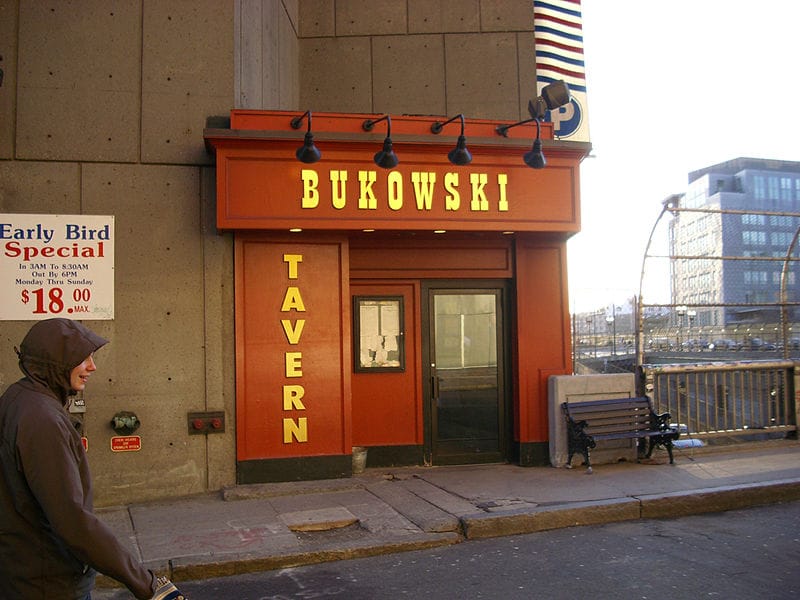Micro-Bio: Charles Bukowski

“People are strange: They are constantly angered by trivial things, but on a major matter like totally wasting their lives, they hardly seem to notice.”
That’s Charles Bukowski. The Bard of Booze. Legendary drunk, cult favorite, darling of the L.A. literary underground.
His true life stories fueled Barfly (1987), which features Mickey Rourke playing Henry Chinaski, Bukowski’s main literary protagonist and real-life mirror. The film enjoys a 7.1 rating on IMDB and gave Bukowski financial security for the first time in his life, at age 67, after a lifetime of writing (and writing and writing and drinking and drinking).
Bukowski was a writer. He worked menial jobs to survive, but wrote to live. He eventually gave up the jobs, saying he could keep doing them and go crazy, or he could “play at writer and starve.” He declared that he had “decided to starve.”
A sympathetic publisher, Black Sparrow Press, gave him a small monthly stipend so he wouldn’t starve and he started cranking out novels that, eventually, attracted a cult following. His first came out in 1971: Post Office (where he worked for years). They say it’s essential reading, along with his Factotum and Women.
He was, critics say, a misogynist. But that’s not the only reason I’m inclined to give him a try.
I’ve started his collection of columns, Notes of a Dirty Old Man. I’m assured it’s great, but I’ve also read enough to assure me that it's, well, "dirty." I (try to) refuse to watch or read anything that spurs me to the confessional, so we’ll see. So far, its content is mixed, but the narrator (I’m listening to it) is the best I’ve heard (a guy named “Will Patton”).
They say his boyhood made Oliver Twist’s look pampered. Abusive father, such horrible acne that the doctor wrapped his face in gauze (think: “Invisible Man”) that made him hideously ugly for the rest of his life. I guess it’s no wonder he drank.
Bukowski was no poseur. He was a drunk. Dispositive proof: He loved Schlitz. And pretty much every other drink, especially whiskey.
Perhaps his biggest claim to fame: He made it to the finals of Modern Drunkard Magazine’s inaugural “Clash of the Tightest,” where he lost to one of the greatest drunks of the twentieth century, Jackie Gleason, in an epic 29-round slam fest. We
He made it to age 74, which is shocking, given his liquid diet. When he started to die, he kept cranking out poems, saying, “If I die, I hope to go with my head on that typewriter. It’s my battlefield.”
Heroes come in different forms, I suppose, especially these days when pretty much everyone is called a "hero." I suppose we can have reprobate heroes.
His best quote of all time: “When you drank, the world was still out there, but for the moment it didn’t have you by the throat.”
